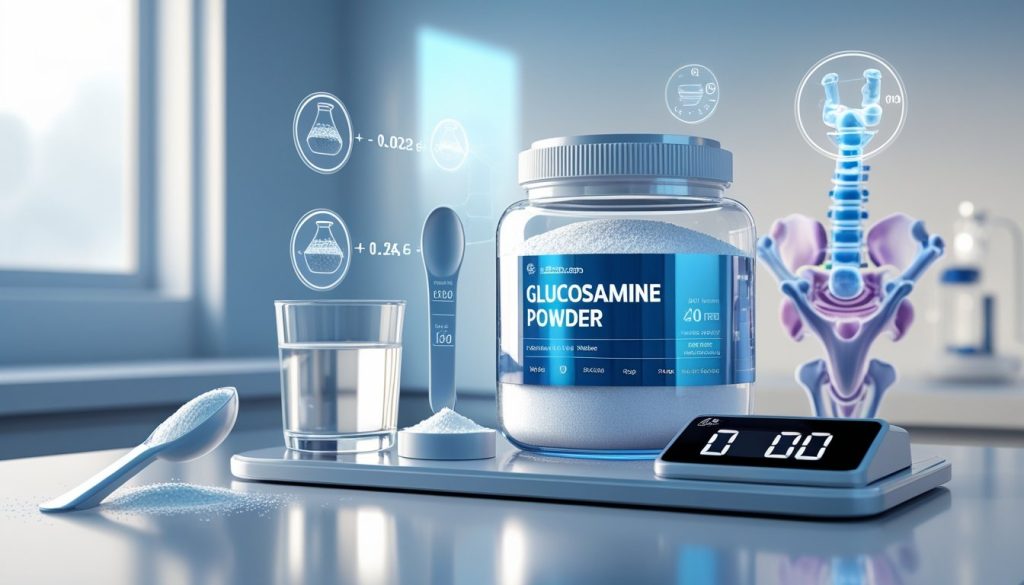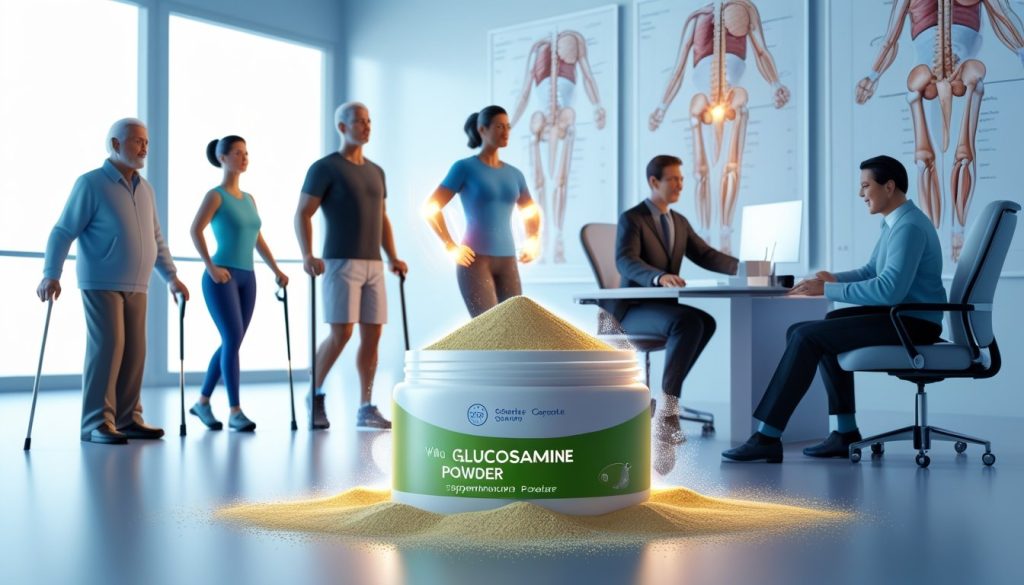Glucosamine powder has emerged as one of the most researched and widely used supplements for supporting cartilage health and joint function.
This naturally occurring amino sugar plays a crucial role in maintaining the structural integrity of cartilage tissue, making it an essential component for anyone seeking to preserve joint mobility and comfort.
Understanding the specific benefits of glucosamine powder can help you make informed decisions about incorporating this powerful supplement into your wellness routine.
Understanding Glucosamine and Its Role in Cartilage Health
Glucosamine is a naturally occurring amino sugar that serves as a fundamental building block for cartilage formation and repair1.
This essential compound is found throughout the body, particularly in cartilage, synovial fluid, and other connective tissues.
The body naturally produces glucosamine from glucose, but this production may decline with age or during certain health conditions.
What Makes Glucosamine Powder Special
Glucosamine powder offers superior bioavailability compared to other forms, allowing for better absorption and utilization by the body. The powder form also provides flexibility in dosing and can be easily mixed with beverages or food for convenient consumption.
The Science Behind Glucosamine's Cartilage-Protective Properties

Research has demonstrated that glucosamine exhibits significant chondroprotective properties through multiple mechanisms3. These include reducing inflammatory mediators, protecting against cartilage degradation, and promoting the synthesis of essential cartilage components, such as proteoglycans and glycosaminoglycans.
7 Evidence-Based Benefits of Glucosamine Powder for Cartilage Health
1. Reduces Joint Pain and Discomfort
Clinical studies have consistently shown that glucosamine supplementation significantly reduces joint pain compared to placebo treatments2. The pain-relieving effects are particularly notable in knee osteoarthritis, where patients experience measurable improvements in comfort levels and daily functioning.
The mechanism behind glucosamine's pain-reducing properties involves its ability to modulate inflammatory pathways and reduce the production of pain-inducing compounds, such as prostaglandin E2. This natural approach to pain management offers a gentler alternative to traditional pain medications.
2. Supports Cartilage Structure and Integrity
Glucosamine powder provides essential building blocks for the synthesis and repair of the cartilage matrix. The supplement supports the production of proteoglycans, which are crucial components that give cartilage its shock-absorbing properties and structural integrity.
Research indicates that long-term glucosamine supplementation can help maintain cartilage thickness and prevent further degradation in individuals with osteoarthritis5. This structure-modifying effect represents one of glucosamine's most significant benefits for long-term joint health.
3. Improves Joint Function and Mobility
Regular glucosamine supplementation has been associated with improved physical function and enhanced mobility5. Patients taking glucosamine powder often report better range of motion, reduced stiffness, and improved ability to perform daily activities.
The functional improvements typically become apparent after several weeks of consistent supplementation, highlighting the importance of long-term use for optimal benefits.
4. Provides Anti-Inflammatory Effects
Glucosamine demonstrates potent anti-inflammatory properties by inhibiting key inflammatory pathways6. The supplement interferes with nuclear factor kappa B (NF-κB) signaling, a pathway that plays a central role in inflammatory responses within joint tissues.
These anti-inflammatory effects extend beyond simple pain relief, potentially helping to slow the progression of degenerative joint conditions and protect against further cartilage damage.
5. Protects Against Cartilage Degradation
One of glucosamine's most important benefits is its ability to protect cartilage from enzymatic breakdown3. The supplement inhibits the activity of matrix metalloproteinases (MMPs), enzymes responsible for cartilage degradation in osteoarthritis.
By reducing the expression of destructive enzymes such as MMP-3, MMP-9, and ADAMTS-1, glucosamine helps preserve existing cartilage tissue and slows the progression of joint degeneration.
6. Enhances Synovial Fluid Quality
Glucosamine contributes to the maintenance of healthy synovial fluid, the lubricating substance that allows smooth joint movement4. This benefit is significant for maintaining joint comfort during movement and preventing excessive wear on cartilage surfaces.
Improved synovial fluid quality translates to better joint lubrication, reduced friction, and enhanced overall joint function.
7. Supports Long-Term Joint Health
Perhaps most importantly, glucosamine powder offers long-term protective benefits for joint health7. Regular supplementation may help prevent the onset of degenerative joint conditions and maintain cartilage health throughout the aging process.
The chondroprotective properties of glucosamine make it an excellent choice for proactive joint health maintenance, particularly for individuals at risk of developing osteoarthritis or those experiencing early signs of joint wear and tear.
Optimal Dosage and Administration of Glucosamine Powder

Recommended Dosage Guidelines
Clinical research supports a daily dosage of 1,500 mg of glucosamine sulfate for optimal cartilage health benefits5. This dosage has been consistently shown to provide therapeutic effects while maintaining an excellent safety profile.
Dosage Considerations:
- Standard dose: 1,500 mg daily, taken as a single dose or divided into smaller portions.
- Timing: Can be taken with or without food, though some individuals prefer taking it with meals to minimize potential stomach upset
- Duration: Benefits typically become apparent after 4-8 weeks of consistent use
Choosing the Right Form of Glucosamine
Glucosamine sulfate has the most robust clinical evidence supporting its effectiveness for maintaining cartilage health. 25 When selecting a glucosamine powder, look for crystalline glucosamine sulfate, which has been specifically studied in clinical trials.
Safety Profile and Potential Side Effects
Glucosamine powder exhibits an excellent safety profile with minimal side effects. 25 Clinical studies have found no significant difference in adverse effects between glucosamine and placebo groups, indicating that the supplement is well-tolerated by most individuals.
Common Considerations
Mild Side Effects:
- Occasional digestive discomfort
- Mild nausea (typically when taken on an empty stomach)
- Rare allergic reactions in individuals with shellfish sensitivities
Important Safety Notes:
- Glucosamine may affect blood glucose levels in some individuals
- Consult healthcare providers before use if taking blood-thinning medications
- Pregnant or nursing women should seek medical advice before supplementation
Maximizing the Benefits of Glucosamine Powder
Lifestyle Factors That Enhance Effectiveness
Exercise and Movement: Regular low-impact exercise can enhance glucosamine's benefits by promoting circulation to joint tissues and maintaining joint flexibility.
Nutrition: A balanced diet rich in anti-inflammatory foods can complement glucosamine's effects and support overall joint health.
Weight Management: Maintaining a healthy weight reduces stress on weight-bearing joints, allowing glucosamine to work more effectively.
Combination Therapies
Many individuals find enhanced benefits when combining glucosamine with other joint-supporting nutrients such as chondroitin sulfate, MSM, or omega-3 fatty acids. These combinations may provide synergistic effects for comprehensive joint support.
Who Should Consider Glucosamine Powder Supplementation

Ideal Candidates
Individuals with Osteoarthritis: Those diagnosed with osteoarthritis, particularly knee osteoarthritis, may experience significant benefits from glucosamine supplementation25.
Active adults, who engage in regular physical activity or sports, may benefit from glucosamine's protective effects on joint health.
Aging Adults: Individuals over 40 who want to proactively support their joint health as natural glucosamine production declines with age.
Special Populations
Athletes: High-impact activities can stress joint tissues, making glucosamine supplementation particularly valuable for maintaining cartilage health.
Individuals with Joint Discomfort: Those experiencing early signs of joint stiffness or discomfort may find glucosamine helpful for maintaining comfort and mobility.
The Future of Glucosamine Research
Ongoing research continues to explore new applications and mechanisms of action for glucosamine1. Scientists are investigating its potential effects on bone health, metabolic function, and other aspects of musculoskeletal wellness.
Future studies may reveal additional benefits and optimal usage protocols, further establishing glucosamine's role in comprehensive joint health management.
Making an Informed Decision About Glucosamine Powder
When considering glucosamine powder supplementation, it's essential to weigh the substantial body of scientific evidence supporting its use against individual health needs and circumstances. The supplement's proven track record for safety and efficacy makes it an attractive option for those seeking natural joint support.
Key Takeaways:
- Glucosamine powder offers multiple evidence-based benefits for cartilage health.
- The optimal dosage is 1,500 mg daily of glucosamine sulfate
- Benefits typically become apparent after 4-8 weeks of consistent use
- The supplement has an excellent safety profile with minimal side effects
- Long-term use may provide the most significant benefits for joint health
Ready to learn more about naturally supporting your joint health? Discover how amino acids play a crucial role in overall wellness and joint function by exploring our comprehensive guide to nutritional supplements and superfoods.
Frequently Asked Questions About Glucosamine Powder
1. How long does it take to see results from glucosamine powder?
Most people begin to experience benefits after 4-8 weeks of consistent daily supplementation, although some individuals may notice improvements sooner.
2. Can I take glucosamine powder if I have diabetes?
While glucosamine may affect blood glucose levels, studies suggest it can improve glucose metabolism. However, diabetics should consult their healthcare provider before starting supplementation.
3. Is glucosamine powder safe for long-term use?
Yes, clinical studies have demonstrated that glucosamine is safe for long-term use with no increased risk of adverse effects compared to placebo.
4. What's the difference between glucosamine sulfate and glucosamine hydrochloride?
Glucosamine sulfate has more robust clinical evidence supporting its effectiveness and is the preferred form for cartilage health benefits.
5. Can I take glucosamine powder with other medications?
Glucosamine is generally safe to take with most medications, but it's essential to consult your healthcare provider, especially if you're taking blood-thinning medications.
6. Does glucosamine powder work for all types of arthritis?
Research primarily supports the effectiveness of glucosamine for osteoarthritis. Its benefits for other forms of arthritis are less well-established.
7. Should I take glucosamine powder with food?
Glucosamine can be taken with or without food, though taking it with meals may help reduce any potential stomach upset.
8. Can vegetarians and vegans take glucosamine powder?
Traditional glucosamine is derived from shellfish, but vegetarian and vegan alternatives made from fermented corn are available.
9. What happens if I stop taking glucosamine powder?
Benefits may gradually diminish after discontinuing supplementation, as the protective effects are maintained through ongoing use.
10. Is glucosamine powder better than glucosamine tablets or capsules?
The powder form may offer better bioavailability and dosing flexibility, although all forms can be effective when taken consistently at appropriate doses.

